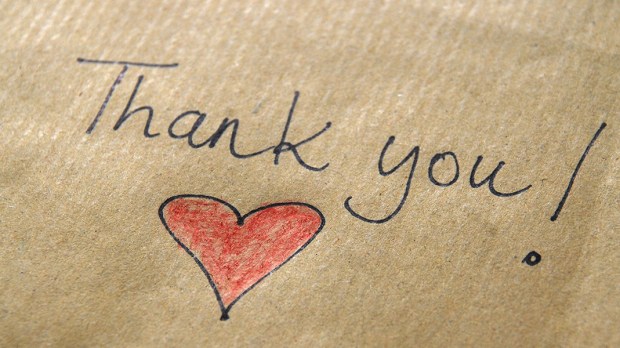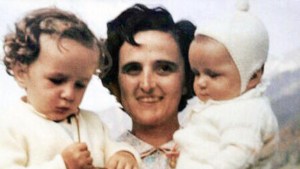Help Aleteia continue its mission by making a tax-deductible donation. In this way, Aleteia's future will be yours as well.
*Your donation is tax deductible!
Writing thank-you notes is the secret to happiness. Bear with me here for a minute. The happiest people I know share something in common. Happy people aren’t complainers; they’re grateful. Have you noticed this in your life? Some of those I know are very well off financially, and some are just scraping by. But, regardless of what’s going on in their lives, they are consistently grateful and happy to be alive. That’s the first part of the secret.
The second part of the secret is this: It is hard to pray when you don’t have a habit of gratitude. You can’t see God when you refuse to recognize the goodness around you.
St. Gianna Molla backs me up on this. She was an incredible woman, wife, and mom who died in 1962, and she believed that“the secret of happiness is to live moment by moment and to thank God for all that He, in His goodness, sends to us day after day.”
So, how does this relate to writing thank-yous? Writing these notes forces me to practice noticing the goodness of the people around me. And I build relationships by sharing with and appreciating people, and these relationships are in turn strengthened by my gratitude toward Love Himself.
Jesus insists that you and I should love the Lord your God with all our heart, and love our neighbor as ourselves. Gratitude allows us to love both God and our neighbor fully.
But who has time for thank-you notes anymore?
Here are some tips to find a moment and build a habit:
Although handwritten thank-you notes sent via snail mail are delightful, I think any medium is beneficial when it comes to saying thank you. Some situations might be best served with a thank-you email, a thank-you text, or a thank-you direct message rather than a handwritten card. Whatever medium you choose, keep it specific, prioritize connection by adding more information rather than less, and make sure your note is fully you.
First, be specific. “Dear Donna, thank you for coming over and helping me. I really appreciate it!” That’s a nice note, but it is boring and doesn’t give any additional insight into the experience. If you’re thanking someone for a gift, say how that gift has helped you or what that gift made you feel. Maybe the gift doesn’t necessarily mean a lot to you, but the fact that someone took the time to get something for you is huge. Sometimes it is easier to be specific if you don’t start by writing “thank you” but wait to write those words until the end. So, a better note might be, “Dear Donna, I was feeling very overwhelmed and frantic while packing for my big move. You coming over and washing dishes and folding laundry for me gave me some hope that I would finish everything in time. Your thoughtfulness and time were much appreciated. Thank you!”
Second, prioritize connection. Giving and receiving gifts involves vulnerability, and all true relationships require moments of taking a chance and sharing something without knowing how it will be received. If you’re taking the time to write down your gratitude in some way, you might as well take another moment to help strengthen your connection with the person you’re thanking. Try adding a quick life update, or share a bit about a common interest you both have.
Third, make sure it’s yours. Some of the most memorable thank-you notes and emails I have ever received were touching because the note was so obviously from the person who sent it — almost like receiving a gift in itself. One email moved me to tears because it was just so simple and thoughtful, just like the person who sent it. Another was a card with a photo of a pet chicken wearing a tiny bonnet — and I still laugh when I think of it. Another was a note that made fun of me the whole way through — but teasing is how the sender shows love so I chuckled to myself and felt loved. Whether you include your trademark wit, standby pull quotes, or fancy stationery/customizable email signature, be yourself in your note!


